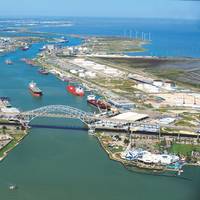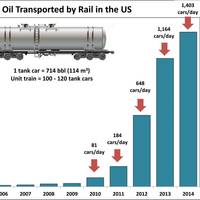Corpus Christi: Energy Port of the Americas

The Port of Corpus Christi lives up to its moniker ‘Energy Port of the Americas,’ as the movement of energy in and out dominates the port’s history and future. John P. LaRue, Executive Director, Port Corpus Christi recently visited Maritime Reporter’s headquarters in New York to discuss the nearly $50 billion in investment projects driving the port forward. “Let’s just start with what we are and what we are not,” said LaRue. “We are not a container port. Up until a few years ago we were an oil import port (serving) three refineries: Citgo, Valero and Flint Hills Resources.
Mega Ships Menace for Shippers
The Global Shippers’ Forum (GSF) says that the use of mega ships and alliances remain the main problems within the shipping sector. The popular belief is that larger ships and alliances are good for competition because of the benefits they give, but the reality is that there are added costs due to the negative externalities they impose on others, says Chris Welsh, general secretary of GSF. The restriction of competition can make other approaches necessary for regulatory policy or competition to address the competition concerns raised by the mega ships and alliances, he said. Allianz Global Corporate & Specialty (AGCS) has warned that the insurance industry is facing an increasing risk of billion-dollar losses from mega-ships as demand for larger container vessels continues unabated.
New Risks Moving Crude Oil by Rail

The rapidly changing landscape of crude oil exploration and drilling in the US and Canada, together with economic considerations, logistical issues related to pipeline transport, and the availability of new types of crude oils, including Bakken crude and various forms of bitumen, have resulted in a very sudden and dramatic increase in the transport of crude oil by railroad. “Unit trains” containing 100 or more tank cars are transporting crude oil through regions that have not previously experienced this type of rail transport, and there are significant concerns about safety.
Somali Pirates Shifting Towards India
Somali pirates, after being neutralized by various countries’ navies, are shifting their locations towards India, but the country is watchful to deal with such threats, says Indian Defence minister Manohar Parrikar. Because their (shipping) lanes are heavily guarded, they have moved 30-40 nautical miles, although they still are 450 nautical miles away from India. Somali pirates have been a threat to international shipping in the Indian Ocean and especially in the Arabian Sea, and have made millions of dollars in ransom by seizing ships and kidnapping ship crews. “They may not be next to India but… We are watchful and careful,” Parrikar said.
Oil Spill NIC Press Briefing, June 11
(June 11, 9:00 a.m. MODERATOR: Good morning. Welcome to today’s briefing. We’ll follow the standard format today. Admiral [Thad] Allen will give the daily update and then we’ll take 10 minutes of questions from the floor and 10 minutes from the phone. Admiral? ADMIRAL ALLEN: Thank you. Good morning. Since it’s Friday, I thought I’d review some of the basic numbers of the response and talk a little bit about some strategic issues regarding the skimmers which are becoming increasingly important in this response as it spreads out (inaudible). Be glad to answer any questions you may have for me at that point. Just to summarize where we’re at on this Friday regarding people—about 25,000 are on the ground down there. This has become the largest oil spill response in our nation’s history.
Mideast Oil Exports Needed To Pull VLCC Rates Up
A resumption in Middle East oil exports to the U.S. is required to drag VLCC tanker rates off the floor, shipping brokers said. A late start to seasonal westbound oil shipments from the Middle East is making tanker brokers ask when relief will arrive. VLCC tanker rates out of the Middle East have nose-dived again in the last two weeks due to a lack of activity, to around W42 east (around $4 per ton) and west (about $7.00 per ton). Even when there has been strong tanker demand from Asia over the last month, large tanker rates have failed to take off because of the lack of oil going west, brokers said. "It is a simple formula. The Red Sea-East journey is much shorter than to the West, and allows a build up of vessels returning to the Middle East.





